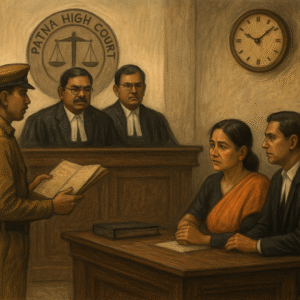Simplified Explanation of the Judgment
The Patna High Court recently dealt with a case where a private company challenged the blocking of its Input Tax Credit (ITC) worth ₹1.18 crore under Rule 86A of the Bihar Goods and Services Tax (BGST) Rules, 2017. The petitioner company, engaged in IT solutions, procured goods and services from vendors and claimed ITC to set off its GST liabilities.
The dispute began when tax authorities in West Bengal found that a supplier—M/s TDML Services Pvt. Ltd.—from whom the petitioner had received substantial ITC, was non-existent at its registered address. Authorities concluded that the supplier had issued fake invoices to pass on ITC without actual supply of goods or services. Based on this, the Additional Commissioner of State Tax in Bihar directed the Joint Commissioner to block the petitioner’s ITC under Rule 86A.
The petitioner argued that:
- Rule 86A requires “reasons to believe” before blocking ITC, and these reasons must be recorded in writing.
- There was no independent application of mind by the Joint Commissioner—he acted solely on directions from the Additional Commissioner.
- No detailed reasons were provided for blocking the ITC.
- The action was arbitrary and violated constitutional provisions.
The State countered that:
- The supplier was proven to be non-existent, making the ITC ineligible.
- Rule 86A allows blocking ITC as an interim measure for up to one year.
- The petitioner had an alternative remedy under the CBIC guidelines to apply for unblocking with evidence.
- Pre-decisional hearings are not mandatory under Rule 86A, but post-decisional remedies exist.
The Court examined the law under Rule 86A, which permits the Commissioner or authorised officer to block ITC if there is reason to believe it was fraudulently availed—such as when claimed on invoices from a non-existent supplier. The Court relied on decisions of the Bombay and Gujarat High Courts that stress the need for reasons to believe, but also note that urgent cases may justify blocking ITC without prior notice, provided post-decisional hearing is granted.
In this case, the Court found that:
- The authorities had sufficient material—inspection reports, search findings, and alert circulars—to justify blocking ITC.
- The Additional Commissioner’s communication clearly set out the factual basis for invoking Rule 86A.
- The petitioner had not challenged the actual blocking order of the Joint Commissioner directly.
The Court upheld the blocking as a lawful interim measure and directed that if the petitioner seeks unblocking under paragraph 3.4 of the CBIC guidelines, the authorities must consider the request promptly and pass a reasoned order after hearing them. Importantly, the Court clarified it had not decided the merits of the case, leaving all issues open for future proceedings.
Significance or Implication of the Judgment
This judgment reinforces that blocking of ITC under Rule 86A is an interim protective measure and not a final penalty. Businesses must be aware that if their suppliers are found non-existent or fraudulent, their ITC can be frozen temporarily. However, the decision also highlights that taxpayers have a clear remedy—approaching the competent authority with evidence to prove the genuineness of their transactions.
For the government, the ruling confirms its authority to act quickly to prevent misuse of ITC, especially in fake invoice cases. For the public and businesses, it underscores the importance of supplier verification and record maintenance to avoid being caught in such disputes.
Legal Issue(s) Decided and the Court’s Decision with reasoning
- Issue: Whether blocking of ITC under Rule 86A without independent investigation and without detailed reasons is valid.
Decision: Yes, in this case—sufficient material existed to form reasons to believe; action was lawful. - Issue: Whether prior hearing is mandatory before blocking ITC.
Decision: No; urgency justifies immediate action, but post-decisional hearing must be provided. - Issue: Whether petitioner had remedy for unblocking.
Decision: Yes; under paragraph 3.4 of CBIC guidelines, they can apply for unblocking with supporting evidence.
Judgments Referred by Parties
- Samay Alloys India Pvt. Ltd. v. State of Gujarat [2022 (61) G.S.T.L. 421 (Guj.)]
- Dee Vee Projects Ltd. v. Government of Maharashtra [2022 (2) TMI 569]
Judgments Relied Upon or Cited by Court
- Dee Vee Projects Pvt. Ltd. v. Government of Maharashtra (Bombay High Court)
- Swadeshi Cotton Mills v. Union of India (1981) 1 SCC 664
- Nirma Industries Ltd. v. SEBI (2013) 8 SCC 20
- Atulya Minerals v. Commissioner of State Tax (Orissa High Court)
Case Title
M/s Graphic Trades Private Limited v. State of Bihar & Ors.
Case Number
Civil Writ Jurisdiction Case No. 4506 of 2025
Coram and Names of Judges
Hon’ble Mr. Justice Rajeev Ranjan Prasad
Hon’ble Mr. Justice Ashok Kumar Pandey
Names of Advocates and who they appeared for
For Petitioner: Mr. Vishal Agrawal, Mr. Gaurav Govinda, Ms. Ananya Maitin
For Respondents: Mr. Vikash Kumar, Standing Counsel-11
Link to Judgment
195c6a42-de52-4138-b1c1-28a9911a4a83.pdf
If you found this explanation helpful and wish to stay informed about how legal developments may affect your rights in Bihar, you may consider following Samvida Law Associates for more updates.







